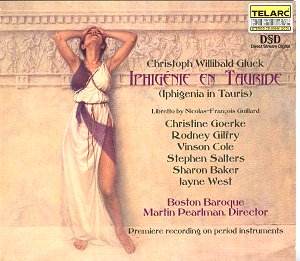GLUCK
Iphigénie en Tauride
 Christine Goerke, Rodney Gilfry,
Vinson Cole, Stephen Salters, Sharon Baker, Jayne West
Christine Goerke, Rodney Gilfry,
Vinson Cole, Stephen Salters, Sharon Baker, Jayne West
Boston Baroque, Martin Pearlman
Recorded 1999
 TELARC CD-80546 (2 CDs)
[134.10]
TELARC CD-80546 (2 CDs)
[134.10]
Crotchet AmazonUK
AmazonUS

Gluck's opera (first performed in Paris on May 18, 1779 and, despite his
age of 65, his greatest success) is a sequel to Iphigénie en Aulis
(1773). Aulis is the island from which Iphigénie was whisked away
by the goddess Diana just before being sacrificed by her own father King
Agamemnon in payment for a favourable wind to get his becalmed fleet on its
way to fight the Trojan War. Once home Agamemnon was murdered by his wife
Clytemnestra and her lover Aegisthus, revenge for the death of Iphigénie
being the pretext. Her brother, Orestes, in turn avenges his father's death
and is exiled by the Eumenides who specialise in tormenting those who kill
their mothers. That's the background to this opera which opens five years
after the Trojan War and traces how Orestes and his friend Pylades find their
way to Tauride and how history nearly repeats itself in the sacrifice which
has to be carried out. Once again in the nick of time all ends happily -
just how is best left to the concise, but still lengthy, synopsis.
Gluck was much admired by both Berlioz and Wagner but is, sadly, rather neglected
- despite the obvious Orfeo which in fact is not really performed
that often. He is a seminal, revolutionary figure in operatic history if
only for his acute sense of drama in a simple musical context. Indeed in
the eternally raging argument, 'prima la musica poi le parole' (epitomised
in Strauss' opera Capriccio) Gluck, despite himself, comes down heavily
on the side of the librettist. You would not think so listening to this opera.
The music has a straightforward simplicity. It traces the onward dramatic
flow of the plot, with seamless transitions between arias and recitatives
and no florid ornamentation in vocal lines nor repeated sections of arias
to hold the action up. The orchestra plays throughout (no recitatives accompanied
by harpsichord), there is no overture but instead a short introduction followed
by storm music; there are ballet scenes with wonderfully powerful rhythmic
dances, only one act of the four has ensembles or duets and a trio. The
orchestral writing (particularly for percussion) is colourfully descriptive,
mood painting in all manner of ways, whether by the choice of instruments
or in the way he writes for them. This also applies to the vivid writing
for the chorus, who inevitably take many roles in such a Greek tragedy.
This is an excellent performance under the careful and detailed direction
of Martin Pearlman. Inevitably Goerke walks away with most of the honours
in her impassioned singing of the title role but Rodney Gilfry as her brother
Orestes is also a stylish artist and gifted with a beautiful voice. Only
Vinson Cole's somewhat nasal tenor sound disturbs. The chorus and orchestra
are excellent. There is a huge amount of beautiful music to enjoy on these
discs, the second of which (at the end) has an informative illustrated talk
by Pearlman which should be listened to first before hearing the opera.
Christopher Fifield
Peter Grahame Woolf has also listened to this set
Gluck is the first operatic composer whose works were never forgotten.
Iphigénie en Tauride, his last masterpiece, was a triumphant
success in 1779. In his notes Julian Rushton celebrates, rather than denigrates,
the composer's wholesale borrowing from the best music in his earlier works,
likening this common procedure to Bach's inspired recycling of his own music
for the B minor Mass. Gluck at the end of his career had taken opera to the
point where the composer is the dramatist (Joseph Kerman) and he guided his
librettists to fulfil his own vision. Orestes (Simon Keenlyside) is pursued
by the Furies after committing matricide, and to assuage the Gods his sacrifice
is imminent at the hands of his (still unrecognised) sister, the priestess
Iphigénie. Gluck contrived powerful continuity for the closing scene.
It is a real cliff-hanger and the outcome remains in doubt until the very
end.
William Christie and Marc Minkowski are the leading interpreters of French
baroque vocal music and this is an estimable realisation, based on scholarly
research but giving full value to the carefully contrived dramatic intensity,
with a strong team headed by Mireille Delunsch in the title role. Gluck chose
his singers for theatrical impact, and their latter-day successors do not
let him down. The recording is vivid and well balanced and the presentation,
with full texts and translations, exemplary. Recommended.
Peter Grahame Woolf

